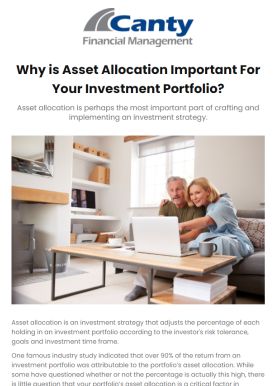
Retirement is a common investing goal for many people. How you invest both while saving for retirement and once you are retired is important and can have a big impact on your financial security in retirement.
Here are some retirement investment mistakes to avoid.
While you are working and saving for retirement there are a number of retirement investment mistakes that we typically see.
Many studies have shown that the biggest single component in the size of your retirement nest egg is the amount saved for retirement. Whether in a workplace retirement plan like a 401(k) or 403(b), an IRA, a self-employed retirement plan, or a taxable investment account, it's important that you save as much as possible each year during your working career.
Even if you find yourself into your 50s or beyond, it’s important to continue saving and investing as much as possible for a retirement that could last 20-30 years or more. These are peak earning years for many people and the money saved during these years is an important component of your retirement nest egg.
How much risk is appropriate for you will vary over the course of your working career. Those who are younger can afford to take more investment risk as they have a long time horizon until these funds will be needed for retirement.
As you get older, the amount allocated toward equities should generally decrease a bit, but your retirement investments should still have enough allocated to stocks to allow for growth. When investing for retirement, you are investing towards your life expectancy, not just a retirement date. Your portfolio still needs a growth component, which generally means a meaningful allocation to stocks, even as you get close to retirement.
Your pre-retirement investing strategy should be a component of your overall financial plan. Your strategy should include an asset allocation plan for your investments reflecting your time horizon until retirement, your risk tolerance, and other factors. As the saying goes, not having a plan is planning to fail.
Once you reach retirement it's perhaps more important than ever to stay on top of your investments. There are a number of investment mistakes to avoid at this phase of life as well.
Inflation has been quite low in recent years, but this will not always be the case. In our opinion, inflation is the single biggest risk factor that retirees face. Even a modest amount of inflation can severely erode your purchasing power over a period of years. With this in mind, it's important that investors continue to take an appropriate amount of risk in their portfolios to help them stay ahead of inflation over the course of their retirement years.
Many investors look at retirement as an event that means a drastic change in their investing habits. We prefer to look at it as a transition, this is especially true when it comes to your investments. If you retire in your 60s, your investments will still need to experience enough growth to stay ahead of inflation and fund a retirement that could last for 20 or 30 years, or more.
How much investment risk you take will depend on your unique situation. Factors such as other retirement resources, sources of income such as Social Security or a pension, your retirement withdrawal strategy, and a host of others will play into your asset allocation decision when investing in retirement.
As important as it is to take enough risk to allow your portfolio to stay ahead of the potential ravages of inflation, you want to balance this against taking too much risk. Those who are retired and in their 60s, 70s, or beyond just don’t have the time to recover from a period of steep losses in the markets as they did in their 20s or 30s. Investing in retirement is a balancing act between taking enough risk, and not taking so much risk as to put your retirement in jeopardy.
Establishing the right asset allocation and regular rebalancing back to that target allocation is critical.
A key issue in retirement is your withdrawal strategy. This entails deciding which accounts will be tapped to provide retirement income and in what order will these accounts be tapped. Retirees may need to work a larger cash allocation into their portfolios than in past years in order to ensure that the cash they need is available when needed to fund their retirement needs.
Investors in retirement should ensure they have anywhere from 1-3 years of liquid cash or near-cash investments available, so they don’t have to sell stocks into a down market to raise the cash they need. This is especially critical for those taking required minimum distributions from an IRA or other retirement account.
Retirees will be inundated with pitches from various financial salespeople trying to convince them to invest in a variety of retirement-oriented financial products. These sales pitches may come in the form of a dinner presentation, or perhaps from a trusted member of your church or synagogue.
They will try to convince you to invest in annuities or other types of insurance products to secure your retirement. While there is nothing wrong with annuities or similar products per se, many of the products that will be pitched to you as a senior are loaded with high fees and restrictions on accessing your money.
A good rule of thumb is that if someone is spending their time and money to sell you something, they are likely doing so in the hopes of a significant payday from their efforts. Unfortunately, many financial salespeople prey on the fears of senior citizens in their sales pitches.
Don’t fall for these sales pitches. Stick with an investing strategy that is based on your overall financial plan for retirement. If you have questions about these types of products, ask your financial advisor for their objective opinion.
We can help you avoid retirement investing mistakes whether you are still accumulating money for your retirement, or if you are already retired. Give us a call to see how we can help you develop and maintain the right investing strategy for your situation.
Bill Canty, CFP®, CPA
Ed Canty, CFP®
Maureen Walsh, EA, Investment Advisor Rep.
Joe Canty, Investment Advisor Rep.
Tina Alteri, CPA, Tax Advisor

